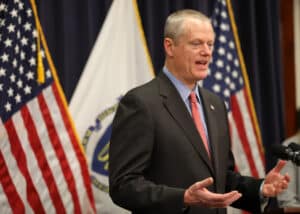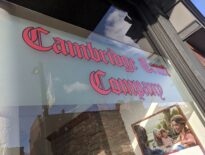
Gov. Charlie Baker addresses discusses his state of emergency declaration with reporters on Tuesday, March 10, 2002 amid a rising number of coronavirus cases in Massachusetts. Photo by Sam Doran | State House News Service
With the number of cases of coronavirus more than doubling from the day before, Gov. Charlie Baker declared a state of emergency Tuesday and imposed broad restrictions on travel for many state employees as Massachusetts moved into a new phase of its response to the global viral outbreak.
Baker had been in Utah on vacation since Friday night, but opted to return to Massachusetts a couple days early as the situation on the ground worsened and the number of coronavirus cases climbed to 92, up from 41 just a day before.
Seventy of those cases, public officials said, were linked to a leadership meeting of Biogen employees in Boston in late February, but additional cases, including a handful in the Berkshires, had no known origin and are being treated as the first evidence of “community spread.”
Baker’s declaration of a state of emergency puts Massachusetts in the company of neighboring states like Connecticut, New York and Rhode Island, where those state governors have already taken a similar step.
The escalation of the state’s response came as a wide array of private institutions began limiting large gatherings and canceling conferences and non-essential travel, and the city of Boston canceled its upcoming St. Patrick’s Day parade and the political breakfast on Sunday.
“There’s no question that the efforts to mitigate the spread of this virus will be disruptive,” Baker said, later adding, “I want to be clear that state government will continue to operate uninterrupted.”
Baker said the declaration would give his administration more “flexibility” to respond to the outbreak, including ordering the cancellation of large events or accessing buildings to store protective equipment for first responders.
Under his order, executive branch employees will be restricted from traveling out of state for work, and the administration is encouraging employees to postpone personal international travel. He also said state workers should, if possible, work from home, and asked private employers to follow suit whenever possible. The restrictions will be revisited in 30 days, or sooner if the situation allows, Baker said.
“We are at a critical point in this outbreak. We’re making specific recommendations that will have a big impact on limiting the spread of disease in our communities. These measures are based on the evidence and facts that we know about this disease and in consultation with the CDC,” said Department of Public Health Commissioner Monica Bharel. “We will need everybody’s cooperation and assistance. We understand that these actions may have a significant impact on the lives of our residents.”
Baker said he was advising older residents and those with underlying health issues to avoid large crowds, including concert venues, conferences and sporting events, though he said he was not prepared to ask schools or professional leagues to cancel their events. He said there was still time for the Boston Athletic Association to make a call on the marathon in April.
“We think large gatherings are probably not a great idea,” Baker said
Some of what the administration was recommending was already being adopted in the private sector.
The Greater Boston Chamber of Commerce announced within about 15 minutes of the governor’s press conference Tuesday that “effective immediately through Friday, May 1, 2020, in-person Chamber programs and events will be rescheduled, include a virtual option, or be only virtual.”
Massachusetts High Technology Council President Chris Anderson said he has spent the past several days seeking guidance from member companies about what they’re doing to protect the health and safety of employees.
Anderson said, in an email, that consistent with the input he received the council will postpone all events expected to attract 25 or more attendees through April, including its March 26 Women in Leadership Initiative Roundtable and the council’s inaugural MATTERS Growth and Competitiveness Conference on April 7.
Secretary of Health and Human Services Marylou Sudders said there were 51 new presumptive positives cases to report Tuesday. About three-quarters of the total cases – 70 of the 92 – have connections to the Biogen conference in Boston last month which has been linked to dozens of infections, Sudders said, and four were directly related to international travel. The remaining 18 cases are “under investigation because they’re newly reported,” she said.
Middlesex County has the greatest number of presumptive cases, 41, followed by 22 in Norfolk County, 20 in Suffolk County, seven in Berkshire County, and one each in Essex and Worcester counties.
The seven cases in Berkshire County seem to be most concerning to state public health officials because they cannot link all of those cases to recent international travel or to isolated and known chains of transmission.
“Here in Massachusetts, person to person transmission of the virus in the community is beginning to occur among individuals without identifiable risk factors,” Bharel said. “As community transmission of COVID-19 becomes more common, the public health approach shifts to one of mitigation and that is reducing the impact.”




 |
| 

